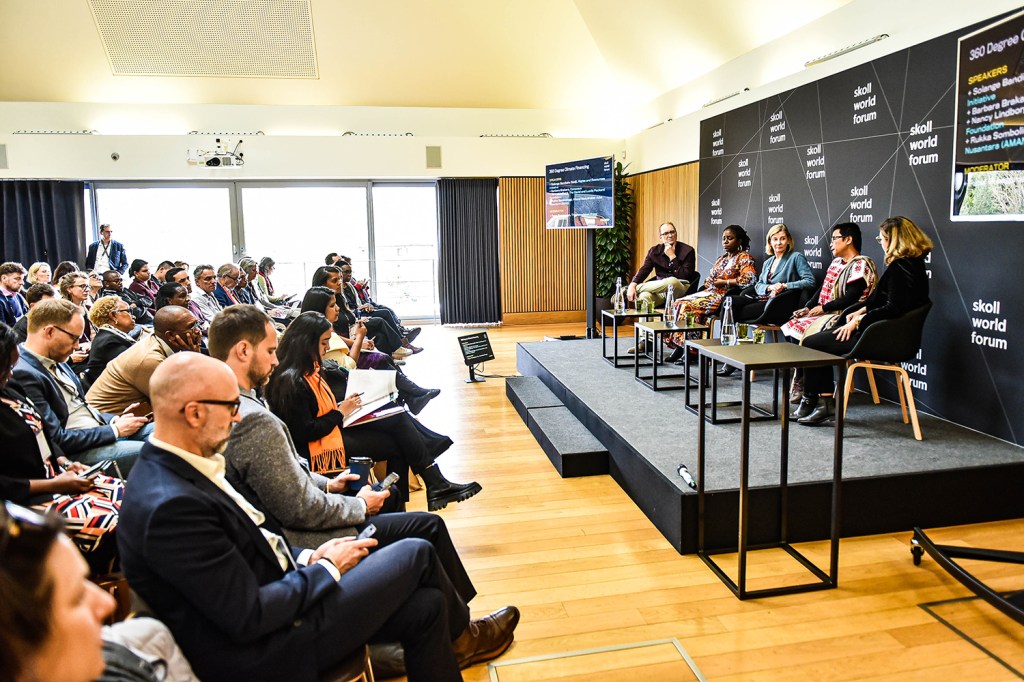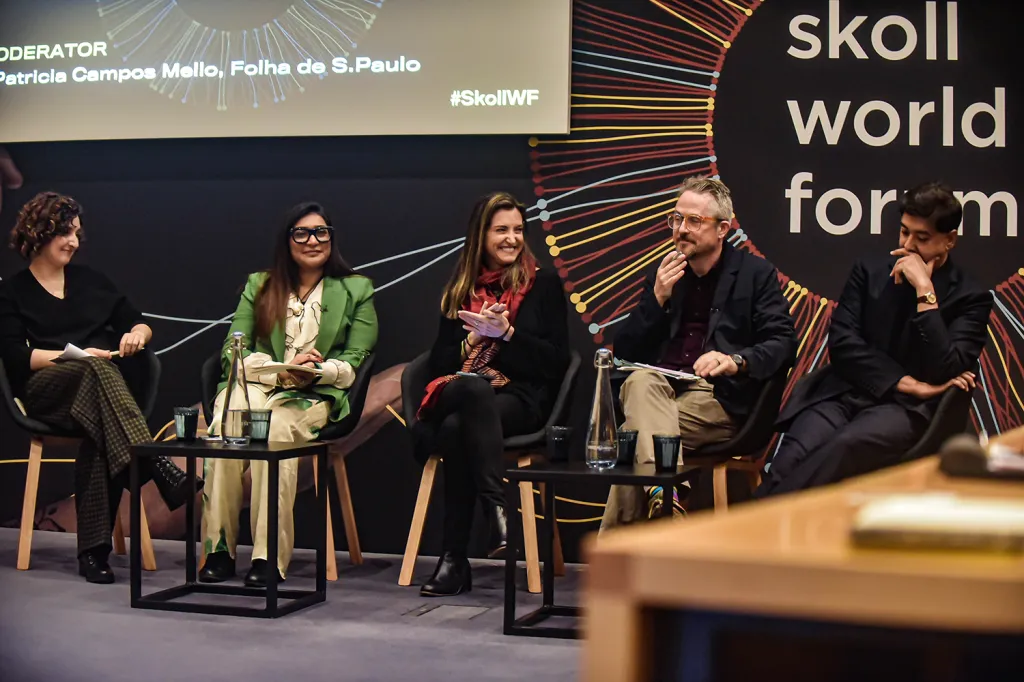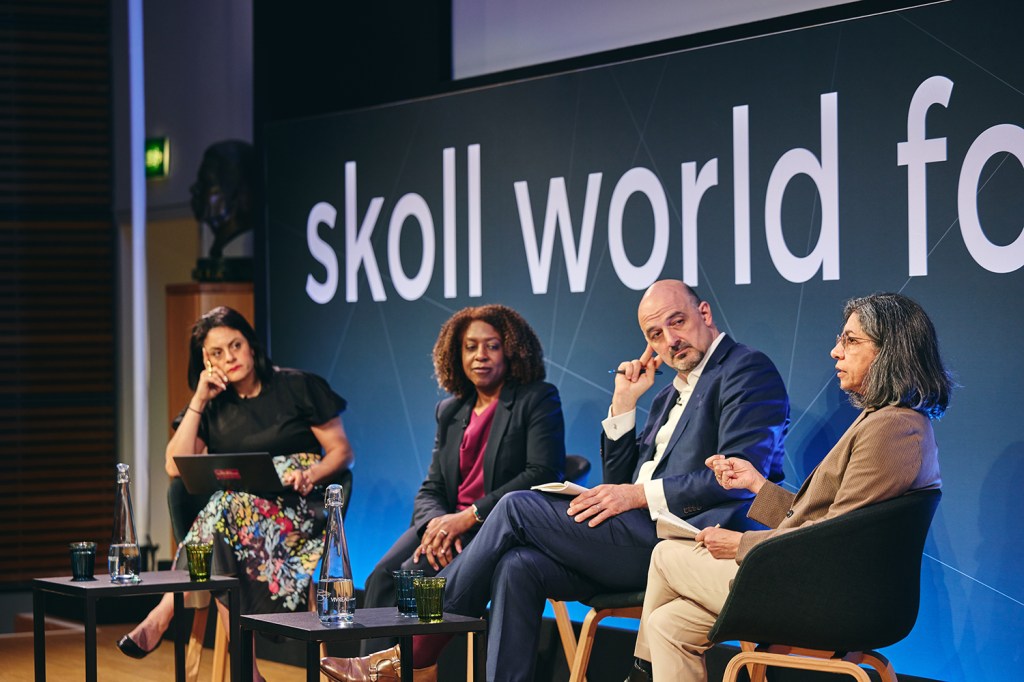Collaborative Action to Address Global Challenges
Key takeaways from the 2024 Skoll World Forum
This synthesis report was produced by FP Analytics with support from the Skoll World Forum.
Every year, the Skoll World Forum brings together leaders, development practitioners, funders, and activists from civil society, philanthropy, government, and the private sector to discuss the critical challenges facing society and identify creative ways to overcome them. The Forum’s participants are thought leaders and changemakers who are developing solutions to global challenges, with the program featuring a combination of plenaries, expert panels, and discussion-based workshops.
The 2024 Forum, held from April 9th to 12th, in Oxford, U.K., took place during a moment of heightened global tension. 2024 has been dubbed “the year of democracy,” with over four billion people going to the polls around the world. Moreover, ongoing conflicts, from Ukraine to Gaza and beyond, are testing long-established alliances while international trust in the United Nations erodes, with growing calls for reform. These political headwinds come as the global community emerges from the COVID-19 pandemic, amidst widespread inflation and rising inequality, and against a backdrop of protracted displacement affecting 130 million people worldwide. Meanwhile, the 2030 deadline for the UN Sustainable Development Goals (SDGs) is quickly approaching, underscoring the need to mobilize significant financial resources to accelerate progress toward their achievement alongside expanded efforts to meet climate and biodiversity goals adopted as part of the UNFCCC’s annual COP gatherings.
Over the course of the Forum, participants grappled with how to work together to address these and other pressing challenges. Throughout discussions on a range of topics, three overarching issues stood out. First, in a historic year for elections, the world is facing threats to democracy, including authoritarianism, the spread of mis- and disinformation, and loss of public trust in institutions and media. Second, and directly connected to the threats to democracy, civil society organizations (CSOs) and multilateral organizations are facing barriers to their work. The space for civil society action is shrinking, particularly in less-mature democracies and non-democratic states, while organizations working with vulnerable groups are struggling to balance supporting immediate crisis response with building long-term resilience. Finally, accelerating climate change is a risk multiplier, exacerbating a range of existing socioeconomic challenges.
Drawing on three high-level panel discussions at the Forum related to these issues, this synthesis report focuses on a few key messages that emerged:
- Building resilient, sustainable systems at the local, regional, and global levels can reduce the impact and frequency of sudden crises and conflicts, and reduce fragility. However, maintaining the capacity to effectively address emergencies while ensuring greater long-term action will require political and institutional leaders to think beyond parliamentary terms, mobilize adequate funds, and plan ahead.
- Multistakeholder collaboration is critical to address contemporary challenges. To date, activism and development efforts on different issues have been largely siloed, presenting obstacles to collaboration and innovation. Funders, thought leaders, and development practitioners from different sectors and levels of society can bring complementary resources, experience, and expertise to address emerging challenges, if they are given the space to connect, strategize, and build trust among partners.
- The needs and expertise of local communities most affected by climate change, displacement and conflict must be prioritized to co-create interventions alongside them. The unique perspectives of these communities position them to advise on strategy and to lead on implementation. This is particularly the case for indigenous communities that are working on issues relating to climate change. They have traditional practices and knowledge to share and are responsible for the stewardship of over 80 percent of the world’s remaining biodiversity.
- Authoritarianism, the spread of mis- and disinformation, lack of public trust, and engagement-driven algorithms for online platforms threaten the independence and impact of civil society and independent journalism, undermining efforts to address broader global challenges. As Amal Clooney noted in the Forum’s closing plenary, “There is a war on truth tellers and journalists, which we need to fight.”

360-Degree Climate Financing

Participants
Solange Bandiaky Badji, President and Coordinator, Rights and Resources Initiative
Barbara Brakarz, Executive Director, Conexsus
Nancy Lindborg, President and CEO, The David and Lucile Packard Foundation
Rukka Sombolinggi, Secretary General, Aliansi Masyarakat Adat Nusantara (AMAN)
Moderator: Peter Prengaman, Global Climate and Environment News Director, The Associated Press
Overview
This panel brought together organizations working on climate change—ranging from civil society organizations (CSOs) and indigenous-led groups to philanthropy. Much of the conversation focused on the challenges that small organizations face in accessing sufficient and sustainable funding, and barriers to climate-focused cross-sectoral and international collaboration. Panelists agreed that traditional funding modes—such as limited-scope grants to address a discrete issue in a specific location—do not reflect the reality of today’s complex and intersecting global challenges and communities’ wide-ranging needs. The impacts of climate change span borders and are felt across different industries, sectors, and regions. Accordingly, the panel concurred that impactful climate financing needs to be more flexible, leaving space for innovation and iteration as circumstances evolve. Relatedly, effective climate change work must be led by the people and communities most impacted by climate change, particularly indigenous communities and women. Above all, the participants agreed that strengthening trust will be critical to impactful, sustainable climate financing in the years to come. Funders who trust their partner organizations to deploy resources where they are most needed, and CSOs who trust that their funders are supportive and understanding of their needs, are well positioned to leverage their shared expertise and resources most effectively.
Key Takeaways
- The urgency of addressing climate change requires a multi-pronged approach that leverages targeted and holistic financing and implementation pathways. As panelist Nancy Lindborg noted, “You either pay now, or you pay a whole lot more later, if the damage continues to accrue. So, we need to mobilize resources from every possible source.” This includes mobilizing funding from national donors, philanthropy, multilateral institutions, and NGOs, but also working with the private sector to access commercial funding and credit. However, this work is often hindered by a lack of trust between and among partners, and the burdens of intensive application processes, which can slow action and underscore divisions between stakeholders.
- Stakeholders with experience working on climate change can leverage existing relationships to build trust and effective relationships among funders and implementers. The David and Lucile Packard Foundation, for example, works with donors who are new to climate-focused philanthropy to identify where resources can be most constructively deployed, connecting funding to recipients. To date, this initiative has channeled over $7 million directly to local and grassroots CSOs.
- Currently available climate funds are inadequate to meet the targets of the SDGs or the Paris Agreement. Funding is also largely being funneled to multilateral institutions and large NGOs, excluding the indigenous and local communities most affected by the impacts of climate change. Empowering these groups and their communities to act urgently could help to transform the impact of climate interventions due to their historic stewardship of biodiverse lands. Examples include the creation of community-led development funds, and the appointment of indigenous ministers such as Sonia Guajajara—Brazil’s first Minister for Indigenous Peoples—who echoed many of these themes in her speech during the opening plenary. Indeed, Minister Guajajara reminded the audience, “To protect and defend indigenous people is to protect biodiversity.”
- Protecting and strengthening democracy, safeguarding public trust, and building information security will be critical to successfully addressing climate change, and to mobilizing resources and finance to that end. Participants noted that public mistrust or denial of climate change and its impacts can affect voting decisions, which—in turn—affect how national budgets are deployed. Tackling mis- and disinformation on climate change, and pushing back against politicians who ignore or deny climate change, will be essential for long-term impact.

Reclaiming Truth in the Age of Information Disorder

Participants
Imran Ahmed, Founder and CEO, Center for Countering Digital Hate
Mevan Babakar, News and Information Credibility Lead, Google
Nighat Dad, Executive Director, Digital Rights Foundation
Sam Gregory, CEO, WITNESS
Moderated by Patricia Campos Mello, Editor-at-Large, Folha de Sao Paolo
Overview
Moderator Patricia Campos Mello opened this panel with a timely reminder from former U.S. Vice President Al Gore, “You can’t solve any crisis before solving the information crisis,” emphasizing the critical roles that trust and information security play in mitigating and eliminating the most pressing challenges facing the global community today. The session highlighted the perspectives of campaigners and advocates working to address online hate, mis- and disinformation, and online threats to human rights, but also those of the private technology sector. Panelists agreed that establishing a trustworthy online information environment requires adaptable and forward-looking policies and regulation, but shared concerns that policymakers, tech companies, and CSOs can be distracted by specific emerging technologies such as generative AI, instead of taking a more holistic, long-term view of the challenge and its solutions. Echoing comments shared throughout the Forum—including during a discussion on Addressing Digital Polarization: Beyond Content Moderation—panelists cautioned that while regulation can be helpful in moderating the actions of large technology companies, legislation focused on content and speech can be weaponized by authoritarian leaders to repress dissent, civil society action, and political opposition. Participants agreed that creating a reliable and fact-based media and information environment will require developing deep trust within communities, including by empowering individuals to fact check content, and teaching them to identify manipulated media.
Key Takeaways
- Building trust within communities, and between communities and information and news platforms, is essential to addressing mis- and disinformation. Community content moderation and fact-checking tools can empower users to identify and spread accurate information. These companies can likewise proactively reduce the spread of false or inaccurate information by demonetizing or deplatforming the responsible accounts and ensuring accuracy within search results. In the social enterprise space, organizations such as Meedan—one of the 2024 Skoll Innovation Awardees—are working to empower local journalists and NGOs to prevent the spread of disinformation. As noted by panelist Imran Ahmed, “Transparency is vital for accountability.”
- The concentration of tech innovation and regulation in the Global North ignores the needs of the rest of the world, where numerous important upcoming elections are likely to be influenced by the quality of information available online, and where communities utilize technology differently to communities in high-income countries. Online platforms need to gain a deeper understanding of the political and information environments of these countries to address the spread of misinformation and dangerous hate speech.
- The spread of mis- and disinformation has demonstrated the indispensable role that journalists and human rights defenders play in safeguarding truth and promoting accuracy. However, while legislation against hate speech or false information could have a positive impact on the information environment, in contexts where authoritarianism is on the rise, it is more likely to be weaponized against dissent, as has been seen during previous elections and political demonstrations. This concern was echoed in a workshop on Empowering Civic Resilience: Strategies for Action in Repression.

Funding and Innovating in Humanitarian Emergencies

Participants
Shamil Idriss, CEO, Search for Common Ground
Tjada D’Oyen McKenna, CEO, Mercy Corps
Binaifer Nowrojee, Incoming President, Open Society Foundations
Moderated by Heba Aly, Advisor, The New Humanitarian
Overview
In a panel discussion bringing together representatives from some of the world’s largest NGOs and humanitarian relief organizations, this session analyzed the challenges facing the global humanitarian community at a moment in which transnational crises are increasing and intersecting. Throughout the discussion, panelists focused on the challenge of balancing immediate emergency response with long-term work to solve the underlying root causes of these crises—including climate change, intercommunal conflict, and increasingly scarce resources—and build resilience. They also noted that this resource scarcity impacts the humanitarian organizations themselves, as they must take time away from critical work on the ground to seek funding opportunities, many of which are limited to specific topics or challenges, despite the intersecting nature of many pressing global challenges. In particular, panelists emphasized the importance of building strong, collaborative relationships—with the philanthropic foundations that can provide financing, with the governments that can either support or hinder effective work, and particularly with the communities and local NGOs that are best placed to identify immediate and long-term needs. Speakers also underscored the salience of trust in emergency settings, a topic that came up in many other sessions throughout the Forum, including a delegate-led discussion on Rethinking Resilience and Global Solidarity in the Polycrisis Era, and sessions on topics from climate change to democracy-building.
Key Takeaways
- The COVID-19 pandemic has dramatically shifted the landscape for humanitarian response. Governments have fewer resources to expend, and are more inclined to spend them domestically, leading to lower international aid and development budgets and waning interest in solving international conflicts or crises. However, the speed with which organizations moved in response to COVID can be instructive—NGOs and other aid organizations can learn from and model effective pandemic responses in their work addressing other health crises and conflicts.
- Today’s crises are protracted and intersecting—their effects and drivers can be difficult to understand or identify, and fatigue and isolationist thinking can set in as conflicts are prolonged. NGOs and other humanitarian organizations can push back against the threat of donors, the media, and the wider public losing interest by applying a long-term lens to crisis response and emphasizing the need to support resilient communities and sustainable funding models.
- Collaboration is key to effective crisis response, and the effective deployment of resources, across sectors and different levels of society. Local organizations and activists can best identify the immediate needs of the communities they serve, but they can benefit from support from external partners who can bring a different or refreshed perspective to protracted challenges. NGOs can act with an agility and flexibility that is not possible within bureaucratic multilateral institutions. Conversely, NGOs, particularly smaller ones, can benefit from the resources—both capacity and financial—that such established institutions can provide.

Looking ahead: from conversation to action
Over four days of panels, interactive workshops, and delegate discussions, Skoll World Forum speakers and attendees alike agreed that in the face of mounting global challenges and cascading risks, systemic, long-term change is necessary to meet global development goals, defend democracy, and pursue global prosperity. Across sessions on issues from climate change to AI, civil society to humanitarian relief, it was clear that collaboration between and among trusted partners is crucial as is the prioritization of the views and needs of the communities most impacted by the challenges at hand. This type of collaboration requires openness to new ideas, the ability to learn from each other’s experience and expertise, and flexibility to adjust strategies and approaches as the situation on the ground changes. The Skoll World Forum, and convenings of this kind, represent an opportunity for individuals from different sectors and industry to come together to foster exactly this kind of collaboration and identify creative solutions to today’s challenges. The next task for participants will be to take forward and implement the opportunities emerging from the timely conversations and dynamic networking at the Forum.
By Isabel Schmidt (Senior Policy Analyst and Research Manager).

This synthesis report was produced by FP Analytics with support from the Skoll World Forum. FP Analytics retained control of the direction and findings of this report. Foreign Policy’s editorial team was not involved in the creation of this content.
